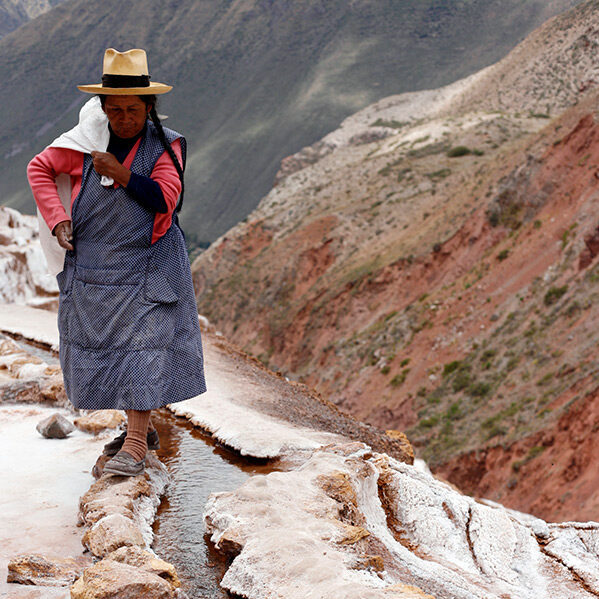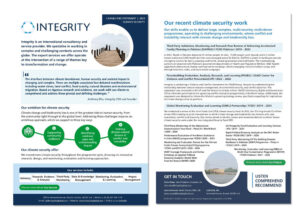Integrity Insights: Working at the intersections
At Integrity, we are committed to unpacking the complexities in development work that are brought on by climate change. We support our clients and partners in delivering climate-aligned solutions to complex and interlinked challenges across our thematic focus areas, including conflict, health, and gender.
Sharing our integrated approach
 Integrity Senior MEL expert and climate security thematic co-lead, Lamia Renaud (left), shared Integrity’s experience and expertise at a British Expertise International (BEI) ‘Intersections With Climate Change Series’ panel event on 26 September. She outlined our integrated approach to climate programming, which combines climate and environmental challenges with security considerations, while working in complex environments. She also presented a step-by-step approach designed to support practitioners to think through design and evaluation with a generational lens.
Integrity Senior MEL expert and climate security thematic co-lead, Lamia Renaud (left), shared Integrity’s experience and expertise at a British Expertise International (BEI) ‘Intersections With Climate Change Series’ panel event on 26 September. She outlined our integrated approach to climate programming, which combines climate and environmental challenges with security considerations, while working in complex environments. She also presented a step-by-step approach designed to support practitioners to think through design and evaluation with a generational lens.
The event was an insightful opportunity to learn from the UK Foreign, Commonwealth and Development Office (FCDO) and other participants, about the ways in which we can all become agents of change in the fight against climate change and biodiversity loss. Presentations covered several examples through which development practitioners can reduce their operational and programmatic footprints, while ensuring they deliver ODA in line with HMG’s climate aligned guidance.
Some of our work at climate security intersections
Among other work, we are conducting a Violence and Conflict Assessment for USAID’s PEARL Program (Program Evaluation, Analysis, Research and Learning) in Kenya, focused on understanding the relationship between natural resource management (NRM), environmental security, and conflict dynamics. We are using political economy analysis to inform the Mission’s upcoming strategy review on the implications of climate change across its portfolio. Our research is helping USAID to integrate conflict and resilience considerations more meaningfully into USAID/Kenya’s sectoral efforts and to build a common understanding of conflict and resilience dynamics as they relate to NRM and climate change.
Integrity, together with its partner Research and Development Solutions, is the Third-Party Validation and Monitoring lead for DAFPAK, the UK Foreign, Commonwealth and Development Office (FCDO) £90m, multi-year investment into family planning across Pakistan. We worked with the (DAFPAK) implementing partners as they pivoted their interventions following deadly floods in 2022 that affected more than one third of the country and displaced 33 million people. Our targeted research examined the effects of the floods on sexual and reproductive health services for women in the most severely affected districts. Our mixed-methods data collection included community-level interviews with women and adolescent girls at the medical camps to obtain information on access and barriers to receiving family planning and maternal care services in flood affected areas. The research identified the strengths and limitations of the crisis response and recommended actions.
We believe that we all have a role to play to slow down the threat to our planet, biodiversity and communities. By expanding our scope and working outside traditional silos, and understanding the world through a system lens, we can make a difference in how we design, implement and evaluate development programmes.
More on our approach to climate and conflict
Register now for when Integrity’s Head of Fragility and Violent Conflict, Ada Sonnenfeld, joins the panel at the BEI Intersection of Climate Change and Conflict Prevention event on 31 October from 10-11.30am (GMT). Follow us on LinkedIn for more details of her presentation.

